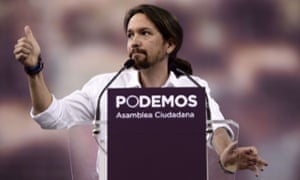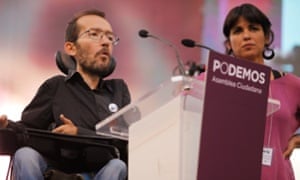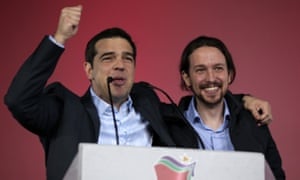Ambrose Evans Pritchard in The Telegraph
Two months of EU bluster and reproof have failed to cow Greece. It is becoming clear that Europe’s creditor powers have misjudged the nature of the Greek crisis and can no longer avoid facing the Morton’s Fork in front of them.
Any deal that goes far enough to assuage Greece’s justly-aggrieved people must automatically blow apart the austerity settlement already fraying in the rest of southern Europe. The necessary concessions would embolden populist defiance in Spain, Portugal and Italy, and bring German euroscepticism to the boil.
Emotional consent for monetary union is ebbing dangerously in Bavaria and most of eastern Germany, even if formulaic surveys do not fully catch the strength of the undercurrents.
This week's resignation of Bavarian MP Peter Gauweiler over Greece’s bail-out extension can, of course, be over-played. He has long been a foe of EMU. But his protest is unquestionably a warning shot for Angela Merkel's political family.
Mr Gauweiler was made vice-chairman of Bavaria's Social Christians (CSU) in 2013 for the express purpose of shoring up the party's eurosceptic wing and heading off threats from the anti-euro Alternative fur Deutschland (AfD).
Yet if the EMU powers persist mechanically with their stale demands - even reverting to terms that the previous pro-EMU government in Athens rejected in December - they risk setting off a political chain-reaction that can only eviscerate the EU Project as a motivating ideology in Europe.
Jean-Claude Juncker, the European Commission’s chief, understands the risk perfectly, warning anybody who will listen that Grexit would lead to an “irreparable loss of global prestige for the whole EU” and crystallize Europe’s final fall from grace.
When Warren Buffett suggests that Europe might emerge stronger after a salutary purge of its weak link in Greece, he confirms his own rule that you should never dabble in matters beyond your ken.
Alexis Tsipras leads the first radical-Leftist government elected in Europe since the Second World War. His Syriza movement is, in a sense, totemic for the European Left, even if sympathisers despair over its chaotic twists and turns. As such, it is a litmus test of whether progressives can pursue anything resembling an autonomous economic policy within EMU.
There are faint echoes of what happened to the elected government of Jacobo Arbenz in Guatemala, a litmus test for the Latin American Left in its day. His experiment in land reform was famously snuffed out by a CIA coup in 1954, with lasting consequences. It was the moment of epiphany for Che Guevara (below), then working as a volunteer doctor in the country.
A generation of students from Cuba to Argentina drew the conclusion that the US would never let the democratic Left hold power, and therefore that power must be seized by revolutionary force.
We live in gentler times today, yet any decision to eject Greece and its Syriza rebels from the euro by cutting off liquidity to the Greek banking system would amount to the same thing, since the EU authorities do not have a credible justification or a treaty basis for acting in such a way. Rebuking Syriza for lack of “reform” sticks in the craw, given the way the EU-IMF Troika winked at privatisation deals that violated the EU’s own competition rules, and chiefly enriched a politically-connected elite.
Forced Grexit would entrench a pervasive suspicion that EU bodies are ultimately agents of creditor enforcement. It would expose the Project’s post-war creed of solidarity as so much humbug.
Willem Buiter, Citigroup’s chief economist, warns that Greece faces an “economic show of horrors” if it returns to the drachma, but it will not be a pleasant affair for Europe either. “Monetary union is meant to be unbreakable and irrevocable. If it is broken, and if it is revoked, the question will arise over which country is next,” he said.
“People have tried to make Greece into a uniquely eccentric member of the eurozone, accusing them of not doing this or not doing that, but a number of countries share the same weaknesses. You think the Greek economy is far too closed? Welcome to Portugal. You think there is little social capital in Greece, and no trust between the government and citizens? Welcome to southern Europe,” he said.
Greece could not plausibly remain in Nato if ejected from EMU in acrimonious circumstances. It would drift into the Russian orbit, where Hungary’s Viktor Orban already lies. The southeastern flank of Europe’s security system would fall apart.
Rightly or wrongly, Mr Tsipras calculates that the EU powers cannot allow any of this to happen, and therefore that their bluff can be called. “We are seeking an honest compromise, but don't expect an unconditional agreement from us," he told the Greek parliament this week.
If it were not for the fact that a sovereign default on €330bn of debts – bail-out loans and Target2 liabilities within the ECB system – would hurt taxpayers in fellow Club Med states that are also in distress, most Syriza deputies would almost relish the chance to detonate this neutron bomb.
Mr Tsipras is now playing the Russian card with an icy ruthlessness, more or less threatening to veto fresh EU measures against the Kremlin as the old set expires. “We disagree with sanctions. The new European security architecture must include Russia,” he told the TASS news agency.
He offered to turn Greece into a strategic bridge, linking the two Orthodox nations. “Russian-Greek relations have very deep roots in history,” he said, hitting all the right notes before his trip to Moscow next week.
The Kremlin has its own troubles as Russian companies struggle to meet redemptions on $630bn of dollar debt, forcing them to seek help from state’s reserve funds. Russia’s foreign reserves are still $360bn – down from $498bn a year ago – but the disposable sum is far less given a raft of implicit commitments. Even so, President Vladimir Putin must be sorely tempted to take a strategic punt on Greece, given the prize at hand.
Panagiotis Lafazanis, Greece’s energy minister and head of Syriza’s Left Platform, was in Moscow this week meeting Gazprom officials. He voiced a “keen interest” in the Kremlin’s new pipeline plan though Turkey, known as "Turkish Stream".
Operating in parallel, Greece’s deputy premier, Yannis Drakasakis, vowed to throw open the Port of Piraeus to China’s shipping group Cosco, giving it priority in a joint-venture with the Greek state’s remaining 67pc stake in the ports. On cue, China has bought €100m of Greek T-bills, helping to plug a funding shortfall as the ECB orders Greek banks to step back.
One might righteously protest at what amounts to open blackmail by Mr Tsipras, deeming such conduct to be a primary violation of EU club rules. Yet this is to ignore what has been done to Greece over the past four years, and why the Greek people are so angry.
Leaked IMF minutes from 2010 confirm what Syriza has always argued: the country was already bankrupt and needed debt relief rather than new loans. This was overruled in order to save the euro and to save Europe’s banking system at a time when EMU had no defences against contagion.
Greek prime minister Alexis Tsipras and finance minister Yanis Varoufakis
Finance minister Yanis Varoufakis rightly calls it “a cynical transfer of private losses from the banks’ books onto the shoulders of Greece’s most vulnerable citizens”. A small fraction of the €240bn of loans remained in the Greek economy. Some 90pc was rotated back to banks and financial creditors. The damage was compounded by austerity overkill. The economy contracted so violently that the debt-ratio rocketed instead of coming down, defeating the purpose.
India’s member on the IMF board warned that such policies could not work without offsetting monetary stimulus. "Even if, arguably, the programme is successfully implemented, it could trigger a deflationary spiral of falling prices, falling employment and falling fiscal revenues that could eventually undermine the programme itself.” He was right in every detail.
Marc Chandler, from Brown Brothers Harriman, says the liabilities incurred – pushing Greece’s debt to 180pc of GDP - almost fit the definition of “odious debt” under international law. “The Greek people have not been bailed out. The economy has contracted by a quarter. With deflation, nominal growth has collapsed and continues to contract,” he said.
The Greeks know this. They have been living it for five years, victims of the worst slump endured by any industrial state in 80 years, and worse than European states in the Great Depression. The EMU creditors have yet to acknowledge in any way that Greece was sacrificed to save monetary union in the white heat of the crisis, and therefore that it merits a special duty of care. Once you start to see events through Greek eyes – rather than through the eyes of the north European media and the Brussels press corps - the drama takes on a different character.
It is this clash of two entirely different and conflicting narratives that makes the crisis so intractable. Mr Tsipras told his own inner circle privately before his election in January that if pushed to the wall by the EMU creditor powers, he would tell them “to do their worst”, bringing the whole temple crashing down on their heads. Everything he has done since suggests that he may just mean it.











